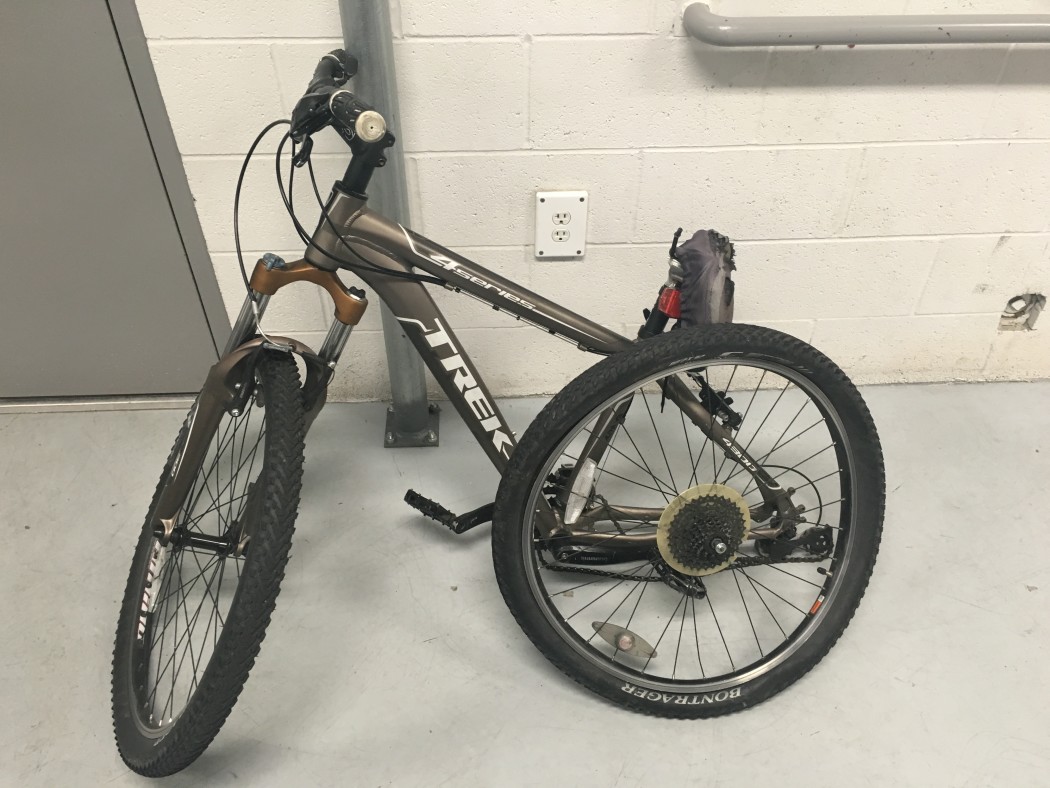Firefighters go the extra mile, purchase new bike for patient
In December, the Logan Fire Department went beyond their required duties to purchase a bike for Matt Palmeira, a USU graduate and host at the Skyroom. He was in an accident on Sept. 22, in which his bike was damaged beyond repair.
Palmeira was not expected to live after the accident. The black Ford Escape hit his mountain bike first, then ran over Palmeira.
“He was conscious and alert, but his color was very off. He was gray,” said Captain Doug Folmer of the Logan City Fire Department. “As we tried to get him to focus, we noticed right off the bat his color and his breathing was shallow.”
Breathing is the first thing firefighters look for, and Folmer said Palmeira’s breathing was not adequate. He was in Trauma Level-I, the most serious classification of trauma, which meant his chances of survival were less than 25 percent.
“He was in extremely critical condition when we got there,” said Brady Hansen, battalion chief for the Logan Fire Department. Hansen is also a paramedic. “We were able give him some treatment on the scene, then transport him to a hospital for a higher level of care.”
The response time for the crew was two to three minutes, which Folmer said was “very, very rapid.” Fortunately, there were already an ambulance and crew out.
“We weren’t far from the hospital, so we got him there within minutes,” Folmer said. He also called ahead to make sure surgeons were ready to respond, but Palmeira was life-lighted to a hospital in Murray. No one — not even Palmeira — expected him to come out alive.
“There was one moment where I told them, ‘I can’t do this anymore, I’m just going to go to sleep,'” Palmeira said. “I closed my eyes, but then forced myself to wake up. I told myself that if I went to sleep, I would die, so I couldn’t allow myself to do that.”
Defying all expectations, Palmeira was in the hospital for only one week.
He said recovery was, and still is, hard. He broke six ribs, fractured a clavicle, broke the other clavicle, collapsed a lung, and scraped his head, and his abdomen muscles were ripped away from the bone. The doctors said Palmeira was lucky — although it was painful, he was able to start walking sooner than they expected. He couldn’t, however, lift any weight with his arms, and he couldn’t wear his backpack.
That was just the physical damage, though.
“People always look at your physical trauma, and once you’re healed they expect you to be all better,” he said. “But it’s so complicated to understand. Yeah, I’m thankful for my life, but normally people never get that close to death and come back.”
Palmeira has been seeing a therapist, and he said he continues to have bouts with PTSD. Occasionally he wakes up in the night, thinking he has been run over by the car again. Walking on the shoulder of the road, hearing a car brake — both induce anxiety.
“I can’t look at ambulances anymore. It just makes my heart ache. The idea that that’s what happened to me — it’s just…” Palmeira shook his head.
Until recently, however, the firefighters who responded to the Sept. 22 accident didn’t know what had happened to Palmeira.
“If I didn’t make a point of going and finding them to thank them, they wouldn’t know that I’d made it,” he said. “It was key to me that I could go and thank them.”
Palmeira found the crew and thanked them, offering everyone a free lunch at the Skyroom, which they refused. He has struggled to find a way to repay people that he considers heroes.
“No, no no — that’s not how I am. We try not to get the ego into our heads that we’re heroes,” Folmer said. “We want to give exceptional service… I don’t consider myself a hero in that way.”
It’s rare for people to come and thank the firefighters, Folmer said, and it was a “total payday” when Palmeira came by.
“Kudos truthfully go to the crew in the back [of the ambulance],” Folmer said. “Casey Crockett, paramedic; Seth Frances, EMT and immediate care; Robert Pitcher, PRA; Scott Best was a student that was helping at the time.”
After hearing that Palmeira’s bike was his main mode of transportation, Folmer started a fundraiser at the fire department for a new bike.
“He’s a starving college student. When somebody’s in a position like that, where something is taken from him like that, that’s pretty significant,” he said. “From what I understand of the situation, it wasn’t his fault — we just wanted to give somebody a boost up, and give them more freedom.”
Palmeira’s old bicycle, Hansen confirmed, was beyond recognition.
“The old one looked like it had been tied in a knot,” Hansen said. “We knew it was an important part of his transportation, once Doug was aware of Matt’s needs. We knew he was recovered and healthy enough to ride a bike. In a matter of a couple days, Doug was able to raise the money for the bike.”
Al’s Sporting Goods gave the fire department a significant discount, Hansen said.
While Palmeira is physically capable of riding the bike, he is waiting until the weather is more conducive. For now, he stays in touch with the fire department. He is friends with Folmer on Facebook, he said, and the crew always wants him to visit and tell them how he is getting along.
“Their work goes beyond what they are expected to do,” he said.
Doctors and nurses are usually thanked after ordeals like his, Palmeira said, and he is thankful to them. But he feels the firefighters are often forgotten.
“I am eternally thankful,” he said. “They are my heroes. It doesn’t matter that it was their job. They saved my life.”
— brennakelly818@gmail.com

